Every day at 9 am, five 20-somethings who live in a 4-bedroom apartment in Bengaluru have a session with their physical trainer.
After a workout, they spend the next 8 to 10 hours in their spacious living room, headphones in place and computer screens in front of them.
Their salaried job: To play video games for the rest of the day.
Nikita Puri reports.
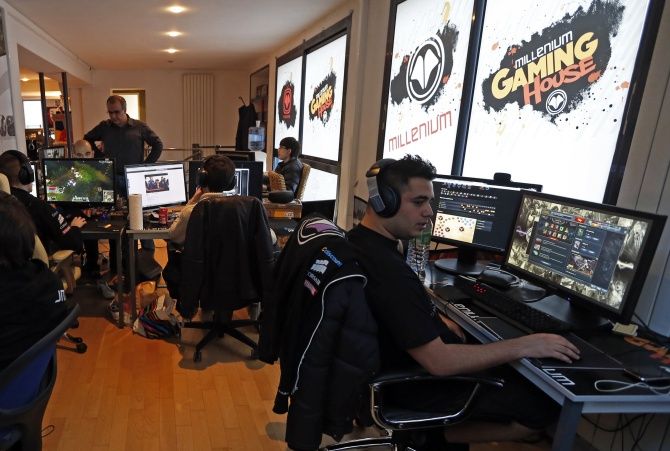
A little over a decade ago, Ankit 'V3nom' Panth found himself in a fix. He had been bringing back money, anything between Rs 500 and Rs 2,000, to his Mumbai home. At other times he'd get home a mouse pad or a keyboard.
His parents were convinced their teenage son was gambling or stealing. Panth told them he was winning the money and goodies at gaming tournaments but they found it impossible to believe him.
"I come from a middle-income background, so this was a lot of money," says Panth, now 29. He still laughs at his parents' disbelief that someone would pay their son for winning a video game match. "I had to convince my mother to speak with some of the tournament organisers to corroborate my story," he says.
The organisers readily backed him up. After all, even at 15, Panth had become a fixture at local tournaments and cyber cafes that promoted gaming. 'Usko harake dikha (defeat him if you can)' was the challenge thrown at every upcoming gamer at Boomerang, the now defunct cyber cafe in Kandivali, north west Mumbai where Panth usually played.
Panth's passion for gaming has taken the shape of Brutality, an eSports squad he founded in 2008 with fellow gamer Aakash 'RiX' More.
Today, the squad is a formidable opponent for those playing Counter-Strike: Global Offensive in India. (Counter-Strike: Global Offensive, or CS:GO, is a multiplayer, first-person shooter video game and ranks among the most popular eSports.)
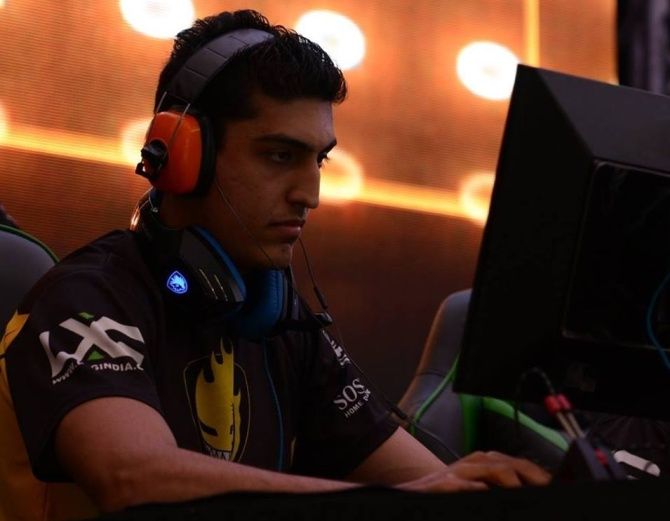
Besides gunning for lucrative prize pots offered at tournaments both within and outside the country, Panth's Brutality is now a well-sponsored organisation backed by the likes of Dell, Alienware, Corsair, Intel and Gold's Gym.
In the virtual world, Panth is known by his gaming name, V3nom. All gamers have 'game names'.
The story of Indian gaming, which started in small cyber cafes, has picked up unprecedented pace in the past three years.
According to a report by the Confederation of Indian Industry, the gaming business in India stood at a little over $540 million in 2017 and is projected for promising growth.
Robust Internet connectivity, higher disposable incomes and the blurring of global lines have collectively contributed to this growth, says Manish Agarwal, CEO of the Mumbai-based Nazara Technologies, a leading gaming firm in India.
Bullish about the future of Indian eSports, Nazara has announced plans to invest Rs 1.36 billion in building an eSports league in India.
Already, homegrown gamers are travelling to countries in Southeast Asia and Europe to compete. Signify, a Mumbai-based Dota 2 team, recently bagged over $10,000 at a tournament in Singapore.
Currently, the most popular games on the competitive circuit include FIFA, CS:GO, Dota 2, Clash Royale, League of Legends, Overwatch, PUBG and Call of Duty.
At the Asian Gamesin Indonesia, eSports made its debut as a demonstration event. The trial run saw 18 countries participate. India was one of them.
Four years from now, at the 19th Asian Games to be held in Hangzhou, China, eSports is likely to make its full medal debut. There's also news of eSports making its debut as a demonstration sport at the Paris 2024 Olympics.
(The jury is still out on which of the games will make the final cut. The International Olympic Committee feels that the violent content, which is the mainstay of a majority of e-games, infringes on values espoused by the Olympics.)
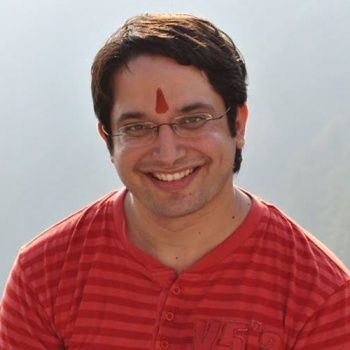
"Indian gaming has come a long way from the time sponsorship meant giving mouse pads," says Akshat Rathee, managing director of the Gurugram-based Nodwin Gaming, a premier eSports and gaming solutions company. (Earlier this year, Nazara acquired a 55 per cent stake in Nodwin.)
Until a few years ago, most Indian gamers played casually rather than competitively. That has changed. Rathee estimates this year's total prize money for competitive gaming in India as Rs 50 million.
One of the biggest indicators of the industry evolving is when publishers (game makers) start setting up offices in India, he says.
"Three years ago, there were a total of two publishers in India (Nazara and Electronic Arts). Today, there are over 65 international publishers. That's an explosion." These include Chinese Internet conglomerate Tencent Holdings.
Nimble fingers, razor-sharp brains, good muscle memory and stellar confidence in one's instincts, all polished with lots of practice, define professional gamers.
Beyond comic cons and gaming-only tournaments, inter- and intra-college competitions have become another place for gamers to test their skills.
In fact, this was how Balaji 'BlizzarD' Ramnarayan dove into the world of Dota 2.
The 23 year old from Pune was still in engineering college when the gaming bug bit him.
"It took me an extra year to finish my degree because when my exams clashed with a tournament, I obviously chose the tournament," he says.
"His priorities are clear," adds Nishant Ahuja, co-founder of Signify, Ramnarayan's team. "Balaji will always choose Dota over everything else."
Signify is supported by Cobx Gaming, an eSports company. While Signify raises its own funds, pays the players and decides the player line-up for competitions, Cobx helps it get around in the gaming ecosystem.
OpTic Gaming, another professional eSports company based out of Texas, now has a team of CS:GO players competing in India. Such collaborations and company-backed teams, though popular in other markets, were previously unheard of in India.
An average gamer gets paid Rs 25,000 to Rs 50,000 a month. On top of that is the cash prize from every tournament that is distributed among the winning team.
Today, teams like Signify, Entity and OpTic India all have gamers as salaried employees. "Besides sponsors, many of these teams have coaches, analysts, managers, nutritionists and physical therapy instructors," says Rathee.
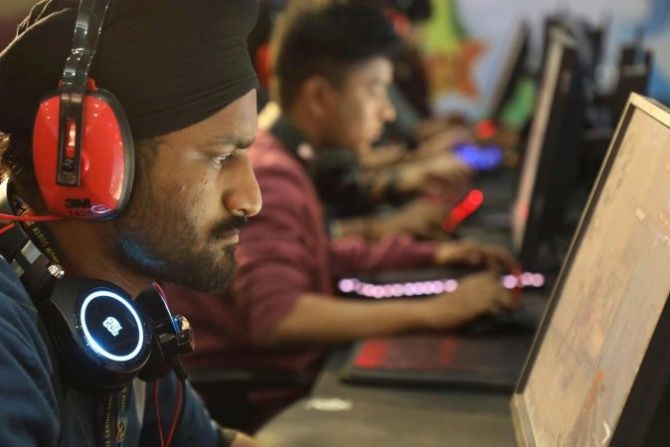
Every day at 9 am, the five 20-somethings who live in a four-bedroom apartment in Bengaluru's HSR Layout have a session with their physical trainer. After a workout, they spend the next eight to 10 hours in their spacious living room, headphones in place and computer screens in front of them.
Their salaried job: To play video games for the rest of the day.
After auditioning over 1,400 players from across the country, OpTic India's CS:GO team came into being in June.
Sabyasachi 'Antidote' Bose, a 22 year old from Kolkata, is the team's in-house sniper and has been living with his fellow players for about three months now.
"We spend at least three hours just discussing strategies," says Lukas 'yb' Groning. After well over a decade of playing in Germany, Groning moved to Bengaluru to be a part of OpTic India. At 27, he's a veteran on the team.
"These things (international companies backing teams) would have started happening much earlier in India but for the events of 2012 that pushed us back," says Chennai-based Sudin 'The Headmaster' Dinesh, one of the country's top FIFA players who represented India in the 2015 Electronic Sports World Convention in Paris.
The event Dinesh is referring to is the India Gaming Carnival 2012, a scam in Delhi that promised gamers well over $300,000 as prize money.
While the gamers started arriving, the organisers were nowhere to be found. They had reportedly made off with the money for the tournament.
"It took us three years to get over that," recalls Rathee. "People had come from as far as New York, Hong Kong and Moscow. It was an unmitigated disaster, a kalank (stain) on Indian gaming."
Rathee, himself a gamer, decided it was time to take charge of Indian eSports. That's how Nodwin was born.
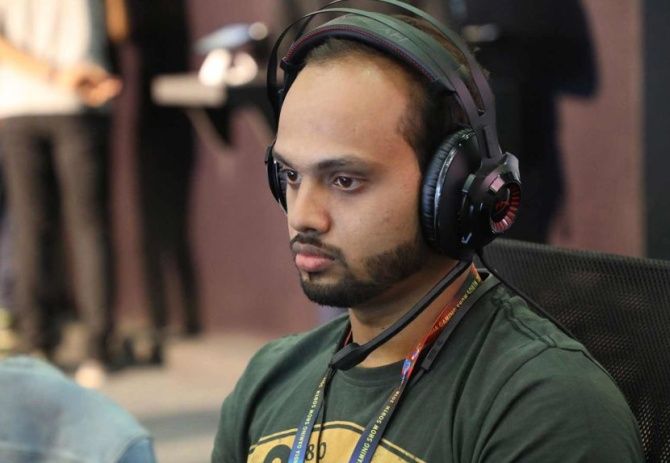
Most gamers are in their 20s. And most of them are men.
While there are women shoutcasters (commentators) who also play, in India they are yet to make it to the big leagues. Even overseas, the number of women competing professionally is low.
Meanwhile, there is both money and fame in professional gaming.
Anuj Sharma is a case in point. A casual gamer in 2009, Navi Mumbai's Anuj 'Amaterasu' Sharma went professional in 2014. Till then, Sharma, a computer science engineer with an additional degree in animation, worked in a company that made mobile games.
Though he played tournaments on the side, the drudgery of the 9-to-5 job got to him.
"Knowing I could slip back into a regular job, I took the chance to give professional gaming my best," says the 27 year old. Sharma is currently a CS:GO player with Entity, a team that has been around since 2016. He's also a celebrity of sorts who fans want to take pictures with.
There are other such "Virat Kohlis of eSports," as Agarwal puts it.
A gaming enthusiast recently travelled for six hours with his mother to meet Panth when he was in Delhi. Panth says parents often thank him for constantly telling his audience that they need to finish their education and have a back-up plan in case professional gaming doesn't work for them. For a lot of people it doesn't.
On average, a full-time gamer puts in eight to 12 hours daily. "It can be brutal," says Dinesh, who pulls off all-nighters before a tournament. There are 2,000 to 3,000 teams in India for CS:GO alone, adds Sharma. "Each of these teams has five players. And only a few teams in India have salaried employees. Everyone wants the top spot."
Many of the practice matches and almost all the tournaments are live-streamed across the globe on various platforms -- TV, YouTube, Hotstar.
"That just adds to the pressure," says Sharma. Besides, tennis elbows and repetitive stress injuries are becoming increasingly common. Additionally, pro-gaming makes for a short career.
"That's why I always tell my followers and every gaming enthusiast I meet that you should have a backup option," says Panth. He has a commerce degree as his fail-safe, and when he isn't training, he's a deejay.
For others like Dinesh, the hope is to continue. "I've got so much from the industry that I'd like to give back, perhaps as a coach or an analyst."
The game is on.









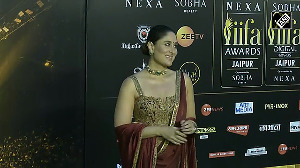


 © 2025
© 2025